-
 Bitcoin
Bitcoin $120400
1.77% -
 Ethereum
Ethereum $3615
7.90% -
 XRP
XRP $3.580
17.84% -
 Tether USDt
Tether USDt $1.001
0.06% -
 BNB
BNB $729.4
1.25% -
 Solana
Solana $179.9
5.04% -
 USDC
USDC $0.0000
0.01% -
 Dogecoin
Dogecoin $0.2311
8.22% -
 TRON
TRON $0.3226
4.04% -
 Cardano
Cardano $0.8490
12.85% -
 Hyperliquid
Hyperliquid $46.45
0.72% -
 Stellar
Stellar $0.4913
8.54% -
 Sui
Sui $4.027
2.00% -
 Chainlink
Chainlink $18.51
11.67% -
 Hedera
Hedera $0.2818
21.51% -
 Avalanche
Avalanche $24.03
7.40% -
 Bitcoin Cash
Bitcoin Cash $508.5
2.90% -
 Shiba Inu
Shiba Inu $0.00001496
3.24% -
 UNUS SED LEO
UNUS SED LEO $8.961
1.83% -
 Toncoin
Toncoin $3.264
3.13% -
 Litecoin
Litecoin $104.6
8.15% -
 Polkadot
Polkadot $4.389
6.11% -
 Uniswap
Uniswap $9.924
10.63% -
 Monero
Monero $337.9
0.49% -
 Pepe
Pepe $0.00001376
2.79% -
 Bitget Token
Bitget Token $4.830
2.46% -
 Ethena USDe
Ethena USDe $1.001
0.05% -
 Dai
Dai $1.000
0.02% -
 Aave
Aave $325.2
1.66% -
 Bittensor
Bittensor $423.7
-0.85%
What is the best Bitcoin ETF for long-term holding?
A Bitcoin ETF offers long-term investors regulated exposure to Bitcoin without direct ownership, with options like Purpose Bitcoin ETF (BTCC) and ProShares BITO providing varying levels of liquidity, fees, and asset backing.
Jul 12, 2025 at 10:01 am
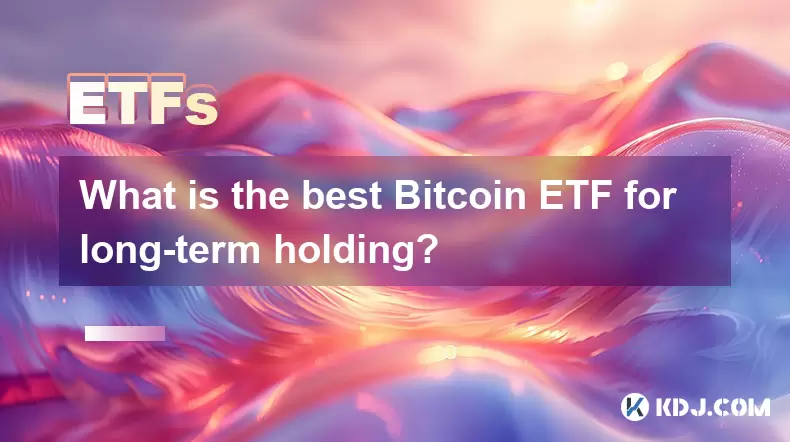
Understanding Bitcoin ETFs
A Bitcoin Exchange-Traded Fund (ETF) is a financial product that allows investors to gain exposure to Bitcoin without directly owning the cryptocurrency. These ETFs are traded on traditional stock exchanges and track the price of Bitcoin, making them accessible to a broader audience, including institutional and retail investors who prefer regulated financial instruments.
For long-term investors, choosing the right Bitcoin ETF involves evaluating several factors such as expense ratios, liquidity, regulatory approval, and how closely the fund tracks Bitcoin’s actual price movements. Since direct ownership of Bitcoin may not be suitable for everyone due to technical or regulatory barriers, ETFs provide a convenient alternative.
Important Note: Not all Bitcoin ETFs are created equal — some hold physical Bitcoin while others use futures contracts or other derivatives.
Key Considerations for Long-Term Investors
When selecting a Bitcoin ETF for long-term holding, investors should pay attention to specific attributes:
- Regulatory Status: In markets like the United States, many Bitcoin ETF proposals have been rejected by the SEC, although some futures-based ETFs are approved. Canadian and European ETFs often have more lenient regulations.
- Expense Ratios: Lower fees can significantly impact long-term returns. Compare annual management fees across different ETFs.
- Underlying Assets: Determine whether the ETF holds spot Bitcoin or uses futures contracts. Spot ETFs tend to mirror Bitcoin's price more accurately.
- Liquidity and Trading Volume: High trading volume indicates strong market interest and easier entry/exit for large positions.
- Custody and Security: Look into how the fund secures its Bitcoin holdings. Reputable custodians and insurance coverage are critical for risk mitigation.
Tip: Always review the ETF’s prospectus and consult with a financial advisor familiar with digital assets before committing funds.
Top Bitcoin ETFs for Long-Term Holding
Several Bitcoin ETFs have emerged as popular choices among long-term investors:
- Purpose Bitcoin ETF (BTCC) – Traded on the Toronto Stock Exchange, this ETF holds physical Bitcoin and has gained popularity due to its simplicity and transparency.
- 21Shares Bitcoin ETP (CBTC) – Listed on Swiss SIX Exchange, it offers low fees and direct exposure to Bitcoin.
- ProShares Bitcoin Strategy ETF (BITO) – Although based on Bitcoin futures rather than spot prices, BITO is one of the most liquid ETFs in the U.S. market.
- WisdomTree Bitcoin ETF (BTCW) – Offers secure custody and is listed on Euronext Amsterdam with competitive fees.
Caution: U.S.-listed spot Bitcoin ETFs are still awaiting full SEC approval as of early 2024, so investors may consider offshore options if available.
How to Evaluate Performance Over Time
Long-term performance evaluation of a Bitcoin ETF requires understanding tracking error, volatility, and compounding effects from fees:
- Tracking Error: This refers to the deviation between the ETF’s price and the actual price of Bitcoin. Spot ETFs typically have lower tracking errors compared to futures-based ones.
- Volatility Exposure: Some ETF structures may amplify or reduce volatility depending on their investment strategy.
- Fee Impact: Even small differences in expense ratios compound over time. For example, an ETF with a 0.75% fee versus one with 0.45% could cost thousands in lost gains over a decade.
- Dividend Equivalents: Some ETFs distribute income similar to dividends, though Bitcoin itself does not generate yield.
Insight: Use historical data tools and compare ETF performance against Bitcoin’s spot price using platforms like Bloomberg or Morningstar.
Steps to Invest in a Bitcoin ETF
If you're ready to invest in a Bitcoin ETF for the long term, follow these steps carefully:
- Ensure your brokerage account supports ETF trading in the relevant market (e.g., TSX, NYSE, or Euronext).
- Research and select the ETF that aligns with your investment goals and risk tolerance.
- Review the ETF’s net asset value (NAV), recent performance, and underlying holdings.
- Place a limit order or market order through your broker’s platform.
- Monitor your position periodically to assess alignment with your portfolio strategy.
Reminder: Always double-check ticker symbols and fund details before placing trades to avoid costly mistakes.
Frequently Asked Questions (FAQ)
Q: Can I hold a Bitcoin ETF in my retirement account?
Yes, depending on your country and brokerage platform, certain Bitcoin ETFs can be held within IRAs or other tax-advantaged accounts. Check with your custodian for eligibility.
Q: Are Bitcoin ETFs safer than holding actual Bitcoin?
Bitcoin ETFs eliminate the need for private key management and offer regulated oversight, which can be seen as safer for non-technical investors. However, they introduce counterparty and custody risks.
Q: Do Bitcoin ETFs pay dividends?
Most Bitcoin ETFs do not pay dividends since Bitcoin does not generate income. However, some funds may distribute capital gains or interest earned from cash reserves.
Q: What happens to my Bitcoin ETF if the issuer goes bankrupt?
In most cases, the assets are held separately from the issuer’s balance sheet. Investors would retain claims to the underlying assets unless the fund structure or jurisdiction dictates otherwise.
Disclaimer:info@kdj.com
The information provided is not trading advice. kdj.com does not assume any responsibility for any investments made based on the information provided in this article. Cryptocurrencies are highly volatile and it is highly recommended that you invest with caution after thorough research!
If you believe that the content used on this website infringes your copyright, please contact us immediately (info@kdj.com) and we will delete it promptly.
- Bitcoin, Crypto Wallets, and Security: Staying Safe in the Wild West of Digital Finance
- 2025-07-18 16:30:12
- Bitget Launchpool Heats Up with Caldera (ERA) Token Rewards!
- 2025-07-18 16:50:12
- XLM Bullish Chart: Analyst Sees Stellar Opportunity
- 2025-07-18 17:10:13
- Memeclip Presale: The 100x Potential CT Degens Are Buzzing About
- 2025-07-18 16:30:12
- Twitter, Investors, and PENGU Trade: Decoding the Signals
- 2025-07-18 17:10:13
- DeFi Liquidity on Fire: Kadena's Chainweb EVM Heats Up!
- 2025-07-18 17:15:13
Related knowledge
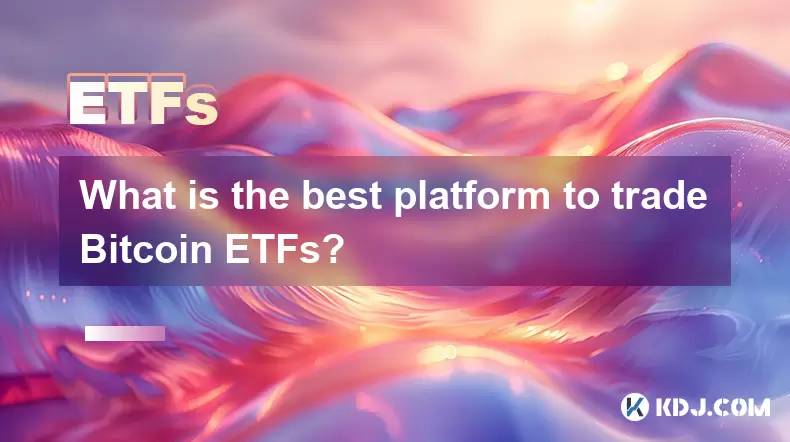
What is the best platform to trade Bitcoin ETFs?
Jul 17,2025 at 03:50pm
Understanding Bitcoin ETFs and Their Role in the MarketBitcoin Exchange-Traded Funds (ETFs) are investment vehicles that track the price of Bitcoin wi...
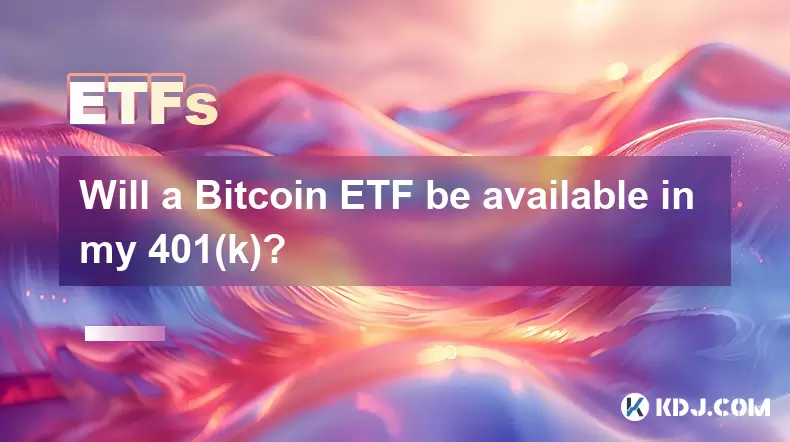
Will a Bitcoin ETF be available in my 401(k)?
Jul 17,2025 at 10:42pm
What is a Bitcoin ETF?A Bitcoin ETF (Exchange-Traded Fund) is an investment vehicle that tracks the price of Bitcoin without requiring investors to di...
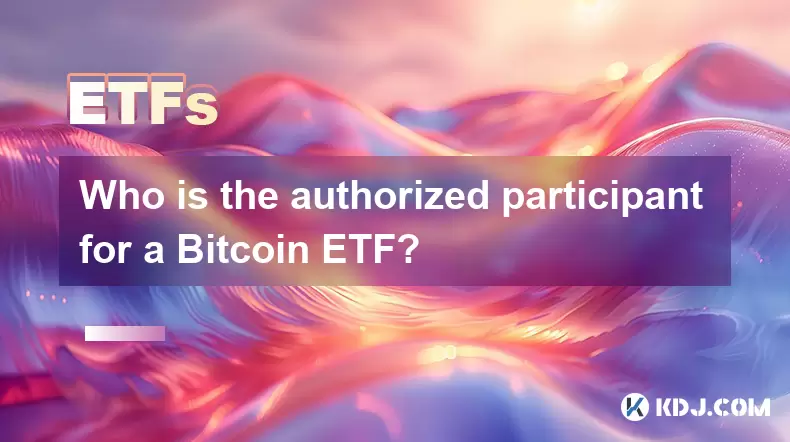
Who is the authorized participant for a Bitcoin ETF?
Jul 18,2025 at 12:42am
Understanding the Role of Authorized Participants in Bitcoin ETFsIn the context of Bitcoin Exchange-Traded Funds (ETFs), an authorized participant (AP...
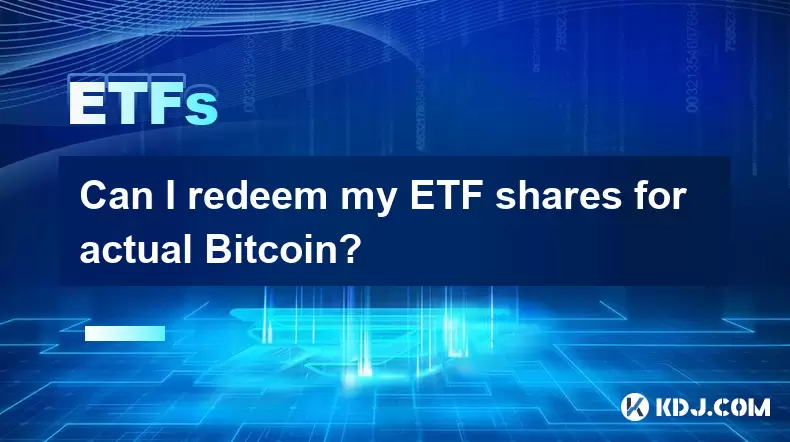
Can I redeem my ETF shares for actual Bitcoin?
Jul 17,2025 at 03:14pm
Understanding ETF Shares and Their Relation to BitcoinExchange-Traded Funds (ETFs) have become a popular investment vehicle for those looking to gain ...
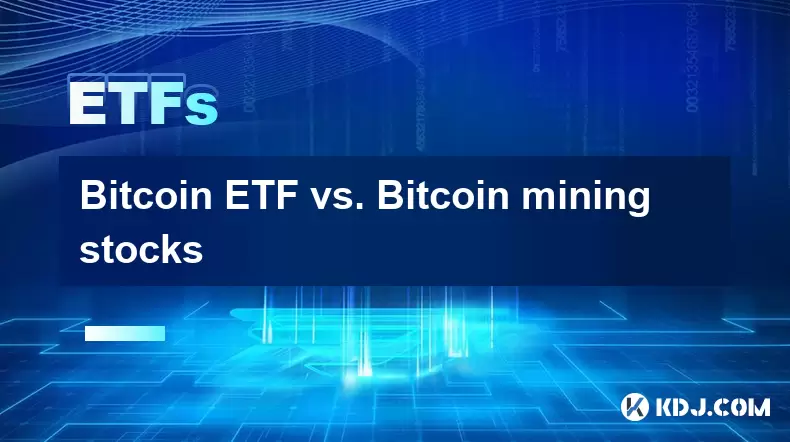
Bitcoin ETF vs. Bitcoin mining stocks
Jul 18,2025 at 04:08pm
What is a Bitcoin ETF?A Bitcoin Exchange-Traded Fund (ETF) is an investment vehicle that tracks the price of Bitcoin and trades on traditional stock e...
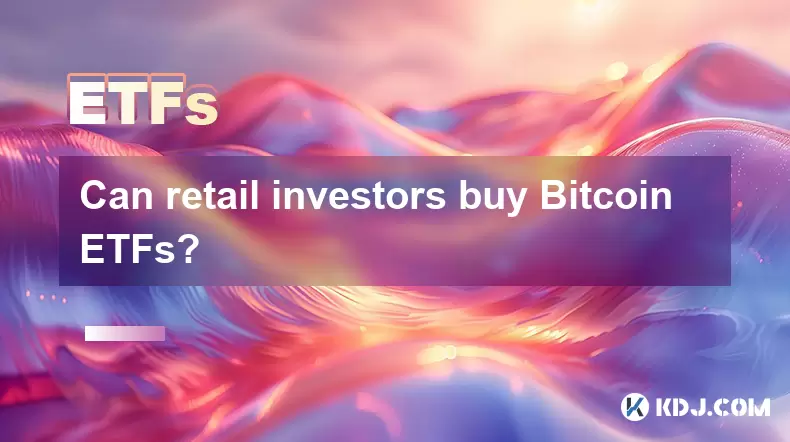
Can retail investors buy Bitcoin ETFs?
Jul 17,2025 at 12:50pm
What is a Bitcoin ETF?A Bitcoin Exchange-Traded Fund (ETF) is an investment vehicle that tracks the price of Bitcoin and trades on traditional stock e...

What is the best platform to trade Bitcoin ETFs?
Jul 17,2025 at 03:50pm
Understanding Bitcoin ETFs and Their Role in the MarketBitcoin Exchange-Traded Funds (ETFs) are investment vehicles that track the price of Bitcoin wi...

Will a Bitcoin ETF be available in my 401(k)?
Jul 17,2025 at 10:42pm
What is a Bitcoin ETF?A Bitcoin ETF (Exchange-Traded Fund) is an investment vehicle that tracks the price of Bitcoin without requiring investors to di...

Who is the authorized participant for a Bitcoin ETF?
Jul 18,2025 at 12:42am
Understanding the Role of Authorized Participants in Bitcoin ETFsIn the context of Bitcoin Exchange-Traded Funds (ETFs), an authorized participant (AP...

Can I redeem my ETF shares for actual Bitcoin?
Jul 17,2025 at 03:14pm
Understanding ETF Shares and Their Relation to BitcoinExchange-Traded Funds (ETFs) have become a popular investment vehicle for those looking to gain ...

Bitcoin ETF vs. Bitcoin mining stocks
Jul 18,2025 at 04:08pm
What is a Bitcoin ETF?A Bitcoin Exchange-Traded Fund (ETF) is an investment vehicle that tracks the price of Bitcoin and trades on traditional stock e...

Can retail investors buy Bitcoin ETFs?
Jul 17,2025 at 12:50pm
What is a Bitcoin ETF?A Bitcoin Exchange-Traded Fund (ETF) is an investment vehicle that tracks the price of Bitcoin and trades on traditional stock e...
See all articles

























































































